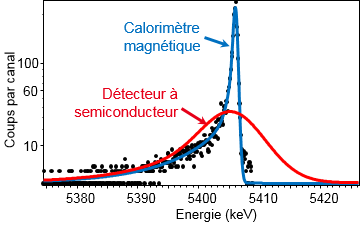 Background
Background
Isotopic analysis of actinides is commonly used in the nuclear fuel cycle or for the control of the Nuclear Non-Proliferation Treaty. Current conventional techniques, mass and alpha spectrometry, are sometimes limited by spectral interferences. The objective is therefore to develop a new technique for the analysis of total decay energy by spectrometry. Thanks to the high resolution of the magnetic calorimeters developed at LNHB, it will be possible to distinguish and quantify all alpha-emitting actinides present.
Achievements
A prototype magnetic calorimeter was developed and tested with a 210Po electro-deposited source integrated into a silver absorber. The measurement of the spectrum of total decay energy was obtained in the 10 mK dilution refrigerator.

Major results
The spectrum obtained showed a resolution of 0.9 keV at an energy of 5.4 MeV, a resolution one order of magnitude better than that of a semiconductor alpha detector. This detector thus offers one of the best performance in the world in terms of resolution.
The aim is now to demonstrate performance on mixtures of actinides and to simplify the integration of sources in absorbers in order to bring this technique towards a competitive use compared to the usual techniques.
